
Illustration by Adam Simpson
Elliphalet Nott, who served as president of Union College for 62 years during the 19th century, still holds the record as the longest tenured executive among higher education institutions in the United States. His closest peer in Canada, R. Neil Snider, retired in 2006 after 32 years with Trinity Western University. If current trends in the tenure of collegiate leaders continue, neither is likely to be surpassed any time soon. A 2017 study by the American Council of Education (ACE) found that contemporary college and university presidents served an average of just over six years, compared to seven years in 2011 and 8.5 in 2006, the most recent statistics in what has been a general trend of declining executive tenure over the past five decades.
For theological schools, it’s a similar story. Paul Beacham at Holmes Bible College in Greenville, SC, served 59 years (1919-1978). No one has come close to that record since. And, as with the ACE study, a review of personnel data reported annually by members of the Association of Theological Schools (ATS) over the past 15 years shows that “the estimated average tenure for presidents is 5.7 years and for academic deans is 4.8 years,” according to Chris A. Meinzer, Senior Director and Chief Operating Officer at ATS.
The data do not include presumed interim positions nor those with tenure of less than two years.
Although the cause of the decline is still being studied, there are seminary leaders who have persisted in their roles beyond the estimated averages reported by ATS.
In Trust spoke with several presidents and deans with tenures ranging from nine to 21 years to learn how they beat the odds and have kept at their work much longer.
Most cited excellent colleagues, leadership, and faculty teams as factors in their long tenures. Others said they enjoyed the entrepreneurial spirit each class of students brought, challenging them and their institutions to innovate as they seek to meet ministry needs in today’s culture. Some noted continued enthusiasm in their roles as leaders. All heard a calling to the work.
On the other side of the coin, and without exception, these leaders cited distressing trends in lower student enrollments and the declining membership of American faith communities as continuing challenges for them and their institutions.
The interview summaries below are far from a “Top 10” list of what makes a successful and long-tenured leader in theological education, but they are a glimpse into how these thoughtful leaders have learned to inspire their institutions and stay motivated for their work over many years.
Gregg Brekke is an award-winning photojournalist and writer dedicated to telling stories of justice and faith.
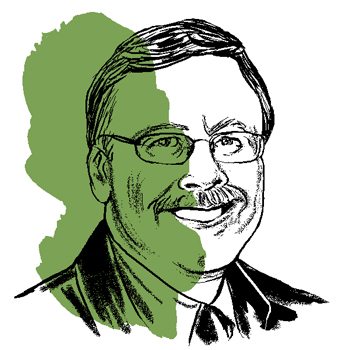
Portraits by Agata Nowicka
21 Years
Stan Porter
McMaster Divinity College
Hamilton, Ontario, Canada
An academic and administrator who has published more than two dozen books in the subject areas of New Testament and Koine Greek, Stan Porter has served as president, dean, and professor of New Testament at McMaster Divinity College since 2001. Prior to this, he’d been head of the department of theology and religious studies at the University of Surrey Roehampton in London for six years.
“I’d never really sought to go into administration,” he said. “That was never my primary goal as a career or in any way a real aspiration. I’m a working academic and take academics very seriously and continue my publishing career even now.”
When presented with an opportunity to become department head at Roehampton, he jumped on it hoping to learn more about academic administration. “I didn’t always like the way it was done,” said Porter. “And I thought academics should be the ones who should serve as the administrator of academic institutions.”
Porter sees himself as a student of higher education and has concluded that leaders at education institutions are generally divided into two types of people: those who maintain and those who are change agents.
“I’m on the change agent side and that was why I was brought into my previous position [at Roehampton],” he said. “I think that was also one of the major reasons I was brought into McMaster. I guess the surprising thing is that I’ve stayed 21 years even though I’m kind of a change person.”
Reinventing himself as the institution undergoes its own transformation, Porter said, is one of the keys to longevity. “Setting goals for creating something new and different and innovative” is important to his leadership, he says, “but probably the major thing that’s enabled me to do this is that is I’ve surrounded myself with good people.”
He credits his staff and faculty “at all different levels” for this success, still seeing himself as a faculty member and contributor in the academic realm even as he works administratively.
As the needs of theological education change, Porter said an important change the school has undertaken during his tenure is to offer M.A. and Ph.D. programs to help address these shifts. The school’s doctorate in practical theology is one of only a few offered in North America.
“We’re trying to figure out what it is to preserve the essentials of seminary education, broadly defined, and then make the right kinds of degree opportunities and curriculum choices available for our students so that they can pursue the right kind of degree appropriate for whatever their vocational callings might be,” he said.
While Porter has felt insulated from any devastating failures, due to trusted relationships with those around him, he said an open mind and a posture of learning has motivated him as a president for more than two decades.
“If you are going to be adventuresome and you are going to try a lot of new things, not everything is going to work every time immediately out-of-the-box,” he said.
“You have to keep open to trying to not dig in and take the stance that, ‘well, that’s what we’ve done before and we’re going to continue doing it.’
“Rather, be open to something else, and that could be something incredible.”
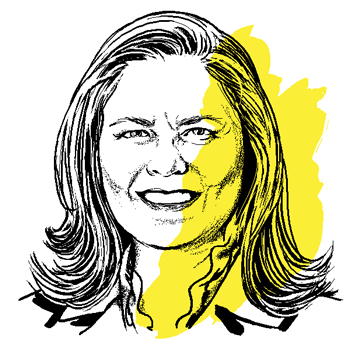
15 Years
Jan Love
Candler School of Theology at Emory University
Atlanta, Georgia
I’m one of the strangest people you will encounter as a CEO or leader of a seminary,” says Jan Love of the Candler School of Theology. “My training, my Ph.D., is in political science – specifically international relations – and I’m not ordained.”
Love spent 22 years as a professor of political science at the University of South Carolina, where she also served as an administrator and taught in the religion department.
She’d also been the chief executive officer of United Women of Faith (formerly United Methodist Women) and was well-known in national and international ecumenical circles. She’d fostered a relationship with Candler’s then-dean Russ Ritchie who was planning his departure and nominated Love to the search committee for his replacement.
“Nobody was more surprised than me that an Emory headhunter called asking for a conversation,” she said. “Never in my wildest dreams would this job have interested me, but the more I got to know the school and the university I thought, ‘Wow, this is a really rare opportunity.’”
Love said she was an “outside of the box” choice to lead the school, one of seven deans managing institutions under the umbrella of Emory University and its provost. But her experience in the academy coupled with high-level church leadership experience proved an excellent fit for the administrative and academic needs of the seminary. As she approaches 16 years at Candler, Love is as excited to be involved in the work of leading the seminary as when she arrived.
It takes a while to implement a new strategic vision, and a long tenure gives you the luxury of doing it very carefully.
— Jan Love
“I wake up every morning to a faculty of about 45 people who are among the smartest folks on the face of the Earth,” she said. “And they’re all deeply dedicated to forming leaders for Christian ministries — they’re nimble, they’re creative, some are incredibly entrepreneurial.
“To be surrounded by folks who know the power of education and know the power of educational transformation for the church and what it means to love God with one’s mind – it’s just fun.”
Describing herself as plainspoken, measured, and diplomatic, Love attributes the success of her long leadership tenure to the core tenets of delivering on promises, clear communications, and hiring excellent people.
Her intimate involvement with the school’s operations have also given Love “the luxury of time to implement, refine, reimagine and reimplement strategic initiatives,” she said.
“It takes a while to implement a new strategic vision, and a long tenure gives you the luxury of doing it very carefully by rallying support for it.”
Love sees the demographic decline of the mainline Protestant church in North America as one of the most significant challenges for the seminary “because it leads to all kinds of challenges in the church itself,” she said.
“We, as the seminary, only exist because we serve the church. If the body we’re serving, the Church of Jesus Christ writ large, is in turmoil and panic and crisis, then that will inevitably have some sort of an impact on us.”
Yet, even with this decline, she said, “God’s at work somewhere, and God’s going to need smart, capable leaders to have effective ministry.”

11 Years
Charisse Gillett
Lexington Theological Seminary
Lexington, Kentucky
I think of myself as having kind of a unique relationship with the institution,” President Charisse Gillett of Lexington Theological Seminary (LTS) said of her time with the school. Prior to coming to the seminary as vice president of enrollment management and special projects, she served on its board of trustees, was a member of the Christian Church (Disciples of Christ) denominational Board of Higher Education Leadership ministries, and she’s been a donor. Her husband also is a Lexington graduate.
Additionally, Gillett is a minister at Second Street Christian Church (Disciples of Christ), where the seminary’s students are often placed for field experience and supervision.
She described her leadership style as one of faith-driven investigation. Taking the lead from research universities, Gillett is “constantly looking at the landscape of what’s going on in higher education.”
Still, she clearly affirms that the goal of theological education at LTS is forming faith leaders – educating clergy and laity to support faith communities.
“The level of experimentation that’s happening across the [education] field is something that really excites me because I can then take that kind of understanding of experimentation and see whether or not it can be applied to what we’re doing,” she said.
Another way Gillett assesses her leadership is by “taking a step back” every four or five years to see “what we’ve accomplished, and what we need to accomplish,” celebrating the gains and discerning how her faculty and staff can best be deployed to meet new challenges.
Structured coaching and leadership development help Gillett evaluate her decision-making and give her gifts to pass along to others.
“It keeps me moving forward and energized about my work of learning from other institutions outside of theological education,” she said. “And that feeds my ability to push our institution forward.”
Keeping an eye on the long-term success of the seminary. Gillett employs three concepts to help her “leave my institutions stronger than when I got here” and become a better leader.
First, she says, is that “the board, your fiduciary board, is critical to anything that you are going to accomplish. You don’t lead alone.”
Her second recommendation is to be transparent. “If you make a mistake, say you made a mistake,” she said. “If you didn’t handle it correctly, say you didn’t handle it correctly.”
Expressing the mission, vision, core values, and strategic imperatives of the organizations is her third principle of leadership, she said. “My role is to make sure that others understand those and how they impact decision making and outcomes at our institution.”
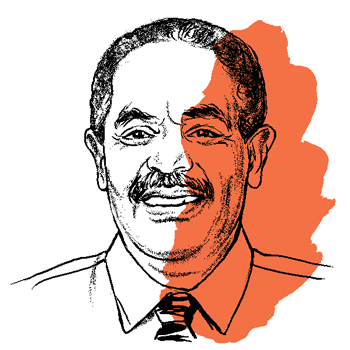
15 Years
Brian Blount
Union Presbyterian Seminary
Richmond, Virginia
After 15 years as a New Testament professor at Princeton Theological Seminary, Brian Blount was recruited to be president of Union Presbyterian Seminary in 2007.
Grateful his administrative gifts had been recognized by colleagues and the search committee, Blount also was aware he’d loved being a professor.
“There’s a joy in teaching that is contagious,” he said, “being able to help students reach the goals and visions they had for themselves. I liked thinking together with colleagues about how we could do this task more efficiently and effectively, living more fully into the vision God had for us as a theological school.”
As he considered moving into the administrative opportunity at Union, he saw he could continue to do many of these things as an administrator and school president of the seminary with two campuses – one in Richmond, Va., and the other in Charlotte, N.C.
“You’re working with faculty, you’re working with friends of the school who will become donors of the school, all to help shape this vision and idea about what the school can be,” said Blount. “It was a natural progression from loving the work I do to wanting to figure out how I could participate with others in strengthening this work.”
The potential for improving the institution continues to motivate Blount and hone his leadership skills.
“There is always opportunity to see God moving in new ways and to help the institution adapt to and adjust to what God is doing,” he said. “How can we then best position the seminary to move within this new economic landscape? How can we build a faculty now that looks more like the church in the present and in the future? How can we draw in students who want to work with persons who represent what the church looks like out there in the world?”
Seeing new students each year gives Blount an “opportunity to remember why you’re doing what you’re doing, and that is to best position an institution to serve the needs of people who are following God’s call into some form of ministry.”
Coupled with this inspiration, Blount sees the gifts of a longer tenure as institutional knowledge, relationship building and trust – all of which foster optimism in the school.
“I’ve been able to nurture relationships with donors, with alumni and with trustees over a long period of time that I believe have created trust,” he said. “And that trust helps me build momentum toward making changes that are helpful.”

20 Years
Jeff Iorg
Gateway Semianry
Ontario, California
Prior to becoming president of Gateway Seminary, Jeff Iorg had never served in an academic leadership position. A Southern Baptist pastor, he had planted churches in several locations, taught a few courses as an adjunct professor, and had been a doctoral program advisor. But it was during his service over a decade as the denomination’s state executive for Oregon and Washington that he developed a much more robust relationship with Gateway Seminary.
“I never, ever intended to work for a school,” he said. “And then they asked me to be president.”
Today, Iorg is nearing the completion of 20 years in the role. “I really don’t do much of the day-to-day operation of our school,” he explained, noting that presidents of Southern Baptist seminaries are best described as “ambassadors as much as internal administrators. We have four vice presidents, and they stay home and run the school, not only by my own ministry tendencies, but by the expectations of our denomination.”
Although Iorg doesn’t consider himself an academic leader, he values and upholds the roles of the faculty, the curriculum, and the administration of the seminary, each consistent with the goal of forming effective and passionate church leaders. He credits this supportive approach to enabling trust with faculty and administrative colleagues.
More pointedly, he believes presidents with experience outside the academy are better prepared to address the challenges faced by the ever-growing functional needs in higher education. “Schools today, while academic institutions, are also corporations that need leadership,” said Iorg.
“They aren’t the same academic institutions as they were 100 years ago. … The successful presidents I know are very strong generalists.”
Another attribute he sees in successful seminary leadership is dexterity combined with the ability to address new situations such as compliance and policy issues.
Iorg also is disciplined in upholding his responsibility to the future of Gateway and has contemplated succession and how to responsibly work with his board. “The number one thing I’m going to tell them is you have to find someone who has a proven track record of solving unforeseen problems,” he said. “I have no idea what the next 10 years will hold, but I can tell you that the last 10 were not anything that I would ever have expected.”
Reflecting on his two-decade tenure at Gateway, Iorg believes there are benefits for the seminary and for himself.
“It gives the institution stability, and it gives a sense of calm. People know they can invest themselves in something that may take a year or two or three to get done, because there’s a continuity of leadership,” he said.
“A second thing it does for the institution is ensure that there’s no one who works here that doesn’t believe in what we’re doing,” said Iorg. “After 20 years of careful hiring, the people who work here all really share the mission.
“This is my last job, and I’ve known that for some time,” he said. “I’ve settled in and relaxed a little bit, so I just work.
“I don’t have to think about the next thing because this is it.”
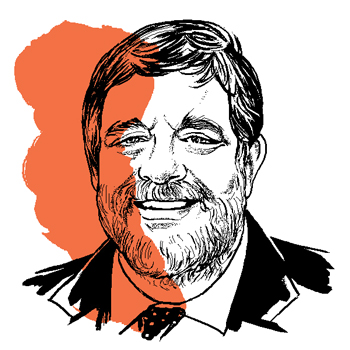
20 Years
David McAllister-Wilson
Wesley Theological Semianry
Washington, D.C.
David McAllister-Wilson didn’t intend to pursue a career in education leadership. The lifelong Methodist left his native Southern California in 1982 to attend Wesley Theological Seminary in the nation’s capital to explore his faith in another context and bring those insights to congregations back home as a pastor.
McAllister-Wilson began working as a student employee in the development office, where his aptitude for the work of fundraising was quickly recognized. Upon graduation he became a full-time employee of the seminary, working hand-in-hand with the school’s then-president Doug Lewis on development and other leadership initiatives for the next 17 years.
After 20 years in various roles under Lewis’s leadership, McAllister-Wilson was delighted when the school’s trustees selected him to succeed his mentor as president of Wesley. He recently celebrated 20 years as president and reflected on the milestone.
“Theological education became my ministry,” he said, acknowledging that is not the pastoral role he’d anticipated when he entered seminary. Additionally, leadership within theological education has motivated him through the seasons of his ministry, both in courses taught through the Doctorate of Ministry program and in the Lewis Center for Church Leadership at the seminary, along with his own reading in interdisciplinary studies at the intersection of economics, sociology and psychology.
McAllister-Wilson credits a diverse and skilled leadership with continuing to cultivate creativity and excellence at the seminary. Wesley’s Board of Governors comprises people from the African American, Korean American and Latin American communities, and from the intelligence, government service, and military communities.
McAllister-Wilson also believes capitalizing on situational opportunities that arise from time to time are key to his long tenure. “It’s not hard to be busy with challenges or problems. Knowing which ones to put energy toward is where I lean on the advice of great employees and the school’s trustees.”
As for changes over his 20 years as president, McAllister-Wilson believes leadership of theological institutions has become more sophisticated and taken on a more corporate and professional structure.
“Like a lot of seminary presidents, I trained as a preacher,” he said. “You’re the primary articulator of the mission, and it’s your job to inspire and say something witty and quote a line of Scripture or a line of poetry. But you can’t stay in that mode.
“You have to lead in a way that is always thinking about the mission of the institution while also thinking about the market environment – and with a firm grasp of how this affects your audited financial statements.”
You have to lead in a way that is always thinking about the mission of the institution while also thinking about the market.
— David McAllister-Wilson
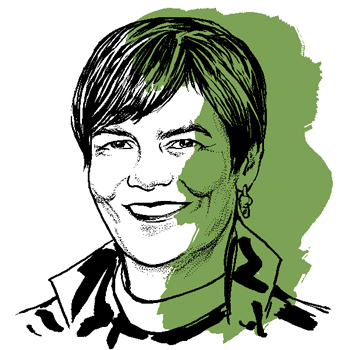
9 Years
Cynthia Kittredge
Seminary of the Southwest
Austin, Texas
Cynthia Kittredge has served in various roles at the Seminary of the Southwest for 23 years. She began in 1999 as an assistant professor before heeding a call to academic leadership in 2006. She was appointed academic dean in 2010 prior to becoming the institution’s dean and president in 2013.
In Kittredge’s Episcopal Church tradition, she occupies two roles. First, as president of the seminary, in which she is the academic and administrative leader of a school. And, as dean and an ordained priest, she is head of the chapel and its worship.
“It’s kind of an ecclesiastical-academic-administrative combo,” she said.
Kittredge has infused personal values of feminist leadership – including welcome and shared leadership – into the culture at the Seminary of the Southwest, and acknowledges that those precepts can cut across the grain in sometimes hierarchical church settings.
“But I do think in Anglicanism, and even in the Episcopal Church, the authority for tradition and innovation is more diffuse,” she said. “And certainly my understanding of the Episcopal Church is that the designated ordained leader gains his or her authority from the assent of the community.”
Kittredge finds these tenets work best at Seminary of the Southwest in the application of four undergirding leadership principles: building strong relationships of trust; reemphasizing and restating the mission of the institution; choosing and supporting the most talented and committed leaders available; and creating accountability in the institution through policies, evaluation, and honest conversations with colleagues and her board.
Kittredge recognizes that people bring their personalities to the work of theological education, eventually changing the “chemistry” of the institution. “I love watching how good people thrive and change the institution and transform themselves,” she said. “I really do feel it’s the action of the Holy Spirit, and I love watching and nurturing that.”
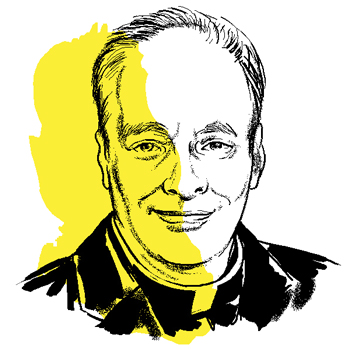
10 Years
Mark A. Latcovich
Saint Mary Seminary and Graduate School of Theology
Wickliffe, Ohio
Ordained a Catholic diocesan priest in 1981 and serving in parish ministry for over a decade, Mark Latcovich began working in the seminary setting as an adjunct professor in 1992. By 1996 he had completed a doctorate in family sociology and transitioned from parish ministry to become dean of students and then academic dean. He became president and rector of Saint Mary Seminary and Graduate School of Theology in 2012.
Latcovich said his parish experience helps him to “see the congregation, the people our students will serve as pastors and minister.” Accordingly, he has positioned the seminary as an institution where “experiences as well as theological or professional training equips [people] for this type of work.”
After 25 years of institutional leadership, he said working with seminarians and preparing them for ministry is still the most exciting part of his vocation.
“I think being able to see their view of life and to see the challenges they see for ministry and their vision for ministry – that’s what keeps me young,” he said. “I can’t stay stagnant as a leader.”
At the 2021 celebration of his 40th year of ordination, Latcovich said his seminary classmates told him the seminary appears to be better equipped at preparing ministers for the parish context. He recognizes that the praise may be the result of innovation, but he also sees that “we have to trust that somehow the Spirit has been guiding and helping all of us through this – you know, the Spirit keeps us fresh.”
Among Latcovich’s leadership principles is the notion of servant leadership, which he attributes to his ordaining bishop, Anthony Pilla.
“One of the things he shared about his own philosophy that I’ve always kept in my mind, especially when I became rector and president [of the seminary] was to always hire people who are more creative and smarter than you are. I’ve kept that as one of my first principles.”
Another principle is the presumption that there is no subject too taboo to talk about. “Give the faculty a chance, in a sense, to air their thoughts and feelings and talk about some of their own ideas,” he said.
He also attributes longevity of service and institutional memory as a complement to such innovation. “We may have tried that before, but my posture has been I’ll listen.”
The third principle, said Latcovich, is “always support the best idea on the table.”
“In some ways it takes a whole diocese to prepare a priest, so we need to create a common vision and language to talk about the human side and the gifts of the candidate and to develop ways to make sure that candidates really assess themselves,” said Latcovich.
“That includes bringing our constituencies, the parishes and the people that are part of the training together on the same page. A seminary today can’t do it alone, and they need the cooperation.”



























